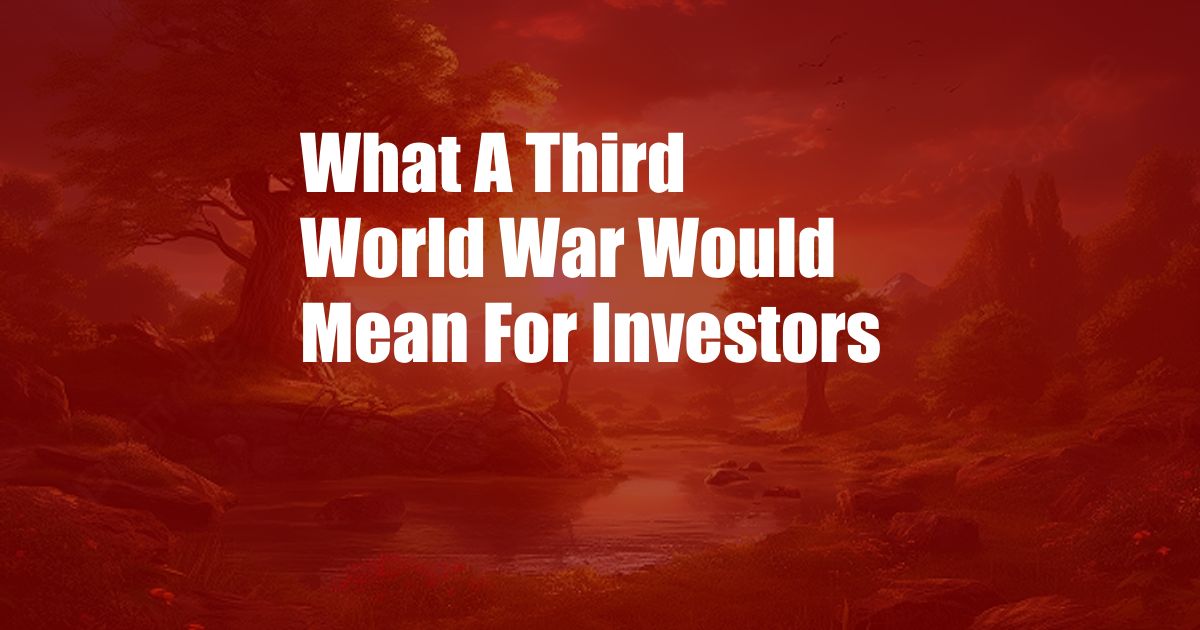
What a Third World War Would Mean for Investors
I remember my father telling me about the Cuban Missile Crisis in 1962. He was a young man then, barely out of his teens, but he could still recall the fear and uncertainty that gripped the nation. For days, the world held its breath, waiting to see if the United States and the Soviet Union would go to war. In the end, cooler heads prevailed, and the crisis was averted. But it was a close call, and it left a lasting impression on my father. He often said that he never wanted to see the world come so close to nuclear war again.
Unfortunately, the world is once again on the brink of a major conflict. The war in Ukraine has escalated, and there are fears that it could spread to other countries. If this happens, it could lead to a third world war, and the consequences for investors would be devastating.
The Economic Impact of a Third World War
A third world war would have a catastrophic impact on the global economy. The destruction of infrastructure, the disruption of trade, and the loss of life would all contribute to a sharp decline in economic output. The world economy would likely enter a deep recession, and unemployment would soar. In addition, the war would put a strain on government budgets, leading to higher taxes and inflation.
The Impact on Financial Markets
The stock market would likely crash in the event of a third world war. Investors would sell their stocks in a panic, and the value of companies would plummet. The bond market would also suffer, as investors would flee to safer assets. In addition, the value of the dollar would likely decline, as investors would seek refuge in other currencies.
Investment Strategies for a Third World War
If a third world war does break out, it is important to have an investment strategy in place. The best strategy will depend on your individual circumstances, but there are some general principles that you can follow:
- Diversify your portfolio. Don’t put all of your eggs in one basket. Spread your money across a variety of asset classes, such as stocks, bonds, real estate, and commodities.
- Invest in defensive assets. During a war, the value of defensive assets, such as gold and utilities, tends to hold up better than the value of riskier assets, such as stocks. Consider increasing your allocation to these types of assets.
- Be prepared to sell. If the war escalates, you may need to sell some of your assets to cover expenses or to protect your capital. Be prepared to take a loss on these investments, and don’t try to time the market.
Conclusion
The prospect of a third world war is a frightening one. However, by taking the necessary steps now, you can protect your investments and your family from the worst effects of the conflict. Remember, the best defense is a good offense. By being prepared, you can weather the storm and come out stronger on the other side.
Are you interested in learning more about the potential impact of a third world war on investors?
FAQs
Q: What are the biggest risks to investors in the event of a third world war?
A: The biggest risks to investors in the event of a third world war are:
- The destruction of infrastructure, the disruption of trade, and the loss of life
- A sharp decline in economic output
- A crash in the stock market
- A decline in the value of the dollar
Q: What are some investment strategies that investors can use to protect themselves from the risks of a third world war?
A: Some investment strategies that investors can use to protect themselves from the risks of a third world war include:
- Diversifying their portfolio
- Investing in defensive assets
- Being prepared to sell